状语从句的翻译
翻译技巧 9 状语从句的翻译
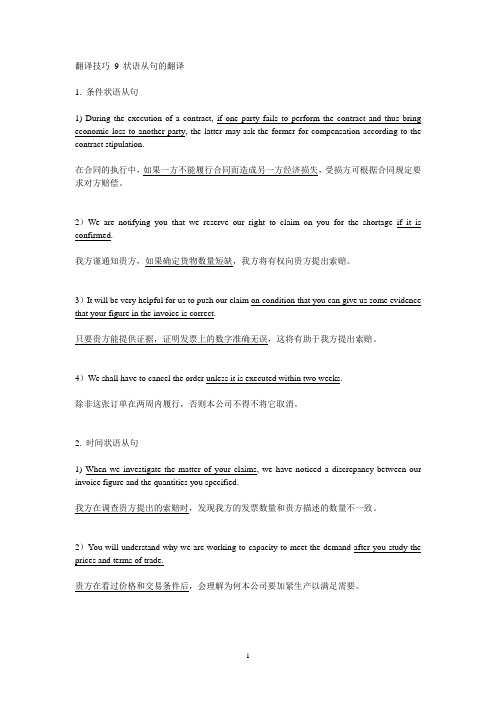
翻译技巧9 状语从句的翻译1. 条件状语从句1) During the execution of a contract, if one party fails to perform the contract and thus bring economic loss to another party, the latter may ask the former for compensation according to the contract stipulation.在合同的执行中,如果一方不能履行合同而造成另一方经济损失,受损方可根据合同规定要求对方赔偿。
2)We are notifying you that we reserve our right to claim on you for the shortage if it is confirmed.我方谨通知贵方,如果确定货物数量短缺,我方将有权向贵方提出索赔。
3)It will be very helpful for us to push our claim on condition that you can give us some evidence that your figure in the invoice is correct.只要贵方能提供证据,证明发票上的数字准确无误,这将有助于我方提出索赔。
4)We shall have to cancel the order unless it is executed within two weeks.除非这张订单在两周内履行,否则本公司不得不将它取消。
2. 时间状语从句1) When we investigate the matter of your claims, we have noticed a discrepancy between our invoice figure and the quantities you specified.我方在调查贵方提出的索赔时,发现我方的发票数量和贵方描述的数量不一致。
(完整版)状语从句知识点大全

(完整版)状语从句知识点大全状语从句是一个句子做另一个句子的状语,用于描述、限制、补充或解释主句的动作或状态。
在英语语法中,状语从句非常常见且广泛应用。
以下是状语从句的一些常见知识点:1. 时间状语从句(Time Adverbial Clauses):用来表示时间,常用的引导词有when, while, as, before, after, until, since等。
例如:I will call you when I arrive home.翻译:我到家时会打电话给你。
2. 地点状语从句(Place Adverbial Clauses):用来表示地点,常用的引导词有where, wherever等。
例如:She can't find her keys anywhere.翻译:她无论到哪儿都找不到她的钥匙。
3. 原因状语从句(Cause Adverbial Clauses):用来表示原因,常用的引导词有because, since, as, for等。
例如:I didn't go to the party because I was tired.翻译:因为我累了,所以我没有去参加聚会。
4. 结果状语从句(Result Adverbial Clauses):用来表示结果,常用的引导词有so, therefore, thus等。
例如:He studied hard, so he passed the exam.翻译:他努力研究,所以他通过了考试。
5. 条件状语从句(Condition Adverbial Clauses):用来表示条件,常用的引导词有if, unless, provided that等。
例如:If it rains tomorrow, we won't go to the park.翻译:如果明天下雨,我们不会去公园。
6. 目的状语从句(Purpose Adverbial Clauses):用来表示目的,常用的引导词有so that, in order that等。
英语语法:五类状语从句的翻译讲解
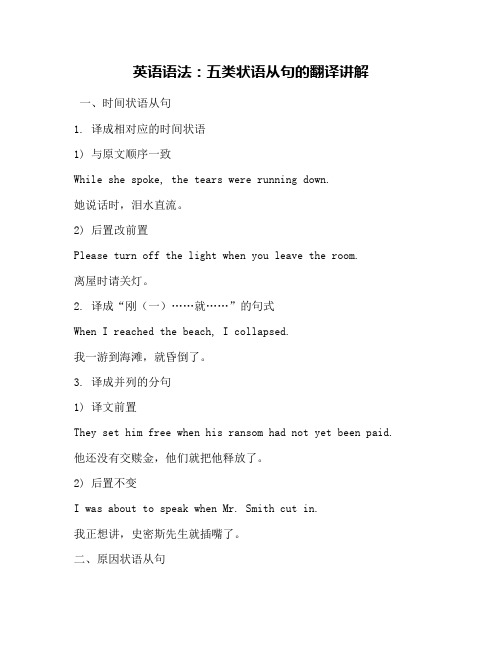
英语语法:五类状语从句的翻译讲解一、时间状语从句1. 译成相对应的时间状语1) 与原文顺序一致While she spoke, the tears were running down.她说话时,泪水直流。
2) 后置改前置Please turn off the light when you leave the room.离屋时请关灯。
2. 译成“刚(一)……就……”的句式When I reached the beach, I collapsed.我一游到海滩,就昏倒了。
3. 译成并列的分句1) 译文前置They set him free when his ransom had not yet been paid.他还没有交赎金,他们就把他释放了。
2) 后置不变I was about to speak when Mr. Smith cut in.我正想讲,史密斯先生就插嘴了。
二、原因状语从句1. 译成表“因”的分句1) “因”在“果”之前The crops failed because the season was dry.因为气候干旱,作物歉收。
2) “果”在“因”之前She could get away with anything, because she looked such a baby.她能渡过任何风险,因为她看上去简直还像娃娃模样。
2. 译成因果偏正复句中的主句Pure iron is not used in industry because it is too soft.纯铁太软,所以不用在工业上。
Because he was convinced of the accuracy of this fact, he stuck to his opinion.他深信这件事准确可靠,所以坚持己见。
3. 译成无关联词的因果关系并列分句Where there is sound, there must be sound waves.哪里有声音,哪里就必有声波。
160句翻译-状语从句.
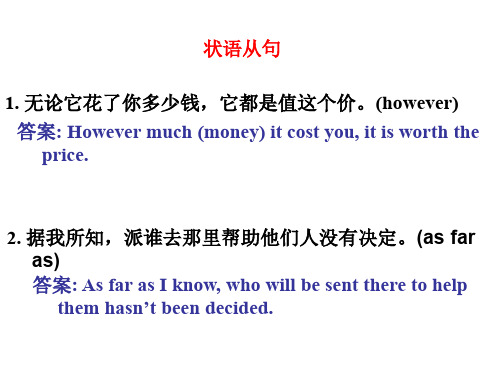
book, lend it to him.
11. 除非现在就采取有效的措施,否则人类就会发现自 己面临灾难。(unless)
答案: Human beings will find themselves facing / faced with disasters, unless measures are taken right now.
状语从句
1. 无论它花了你多少钱,它都是值这个价。(however) 答案: However much (money) it cost you, it is worth the price.
2. 据我所知,派谁去那里帮助他们人没有决定。(as far as) 答案: As far as I know, who will be sent there to help them hasn’t been decided.
3. 你最好带把伞以防下午下雨。(in case) 答案:You’d better take an umbrella with you in case of
rain/ in case it rains in Байду номын сангаасhe afternoon.
4. 每次我见到这张照片就是我想起我们在国外度过的日 子。(every time)
ago.
7. 这是一次对她的傲慢如此痛苦的教训(a lesson to…) 她永远也不会忘记。(such…that)
答案:It is such a bitter lesson to her pride that she will never forget it.
英语状语从句的翻译

众多家庭搬出安定的社区,离开交往多年 的朋友,远离大家庭的其他成员, 日常信息 来源就此切断。
15
48
2 原因状语从句的翻译
Since the electrical inventions which Edison had given us were very important, we could not live without them—not for one minute. 爱迪生为我们发明的各种电器太重要了, 我们的生活离不开它们——一刻也离不开。
48
要是下雨,咱们就不能步行上那儿去了。
17
16.3 条件状语从句的翻译
If I could relive my life, I would lead quite a different life, leaving less regrets. 如果我可以重新过日子, 我会生活得截然不 同,不会留下这么多遗憾。
48
16
3 条件状语从句的翻译
3.1 译成相对应的表条件的分句 If the epidemic cannot be controlled effectively, the whole country will come into chaos. 如果这种流行传染病得不到有效控制, 整个 国家将会陷入一片混乱之中。 We won’t be able to go there on foot in case it rains.
48
7
1 时间状语从句的翻译
One must sow before one can reap. 只有播种,才能有收获。(译成汉语的必要 条件复句的正句。也可根据汉语表达习惯, 译为:一份耕耘,一份收获。) Before manned spacecraft could be sent to space, the problem of getting the spacecraft safely back to earth had to be solved. 为了把载人的宇宙飞船送到太空上去,就 必须解决使飞船安全返回地面的问题。(译 成汉语单句的目的状语)
英语状语从句的翻译

1.There is a virtual limit on how long we can hope to remain alive,however lucky and robust we are。
[参考译文] 不管我们多么幸运,多么健壮,我们所希望的长寿年龄实际上是有限度的。
[结构分析] 该句分为两部分:(There is a virtual limit on how long we can hope to remain alive, ) (however lucky and robust we are。
),第一部分是主句,第二部分是however引导的让步状语从句;主句中on…alive是介词短语,作limit的后置定语,how引导的从句是介词on的宾语,该从句的主语是we,谓语是can hope to remain,表语是alive;让步状语从句的主语是we,谓语是are,表语是lucky and robust。
这句话翻译时也要将从句提前,然后再译主句。
[知识链接] virtual实际的;remain保持;a limit on…对……有限制;alive活着的;lucky幸运的;robust健壮的。
2. While formal learning is transmitted by teachers selected to perform this role, informal learning is acquired as a natural part of a child's development。
[参考译文] 尽管正式的学习过程是由挑选出来担当此角色的教师来进行的,非正式的学习过程却是作为孩子成长的自然一部分而完成的。
[结构分析] 该句可拆分为两部分,(While formal learning is transmitted by teachers selected to perform this role,) (informal learning is acquired as a natural part of a child's development. ),第一部分是While引导的让步状语从句,第二部分是主句;从句中,formal learning是主语,谓语是is transmitted,过去分词selected 作teachers的后置定语,是不定式to perform this role作selected的目的状语;主句中,informal learning是主语,谓语是is acquired,介词短语as a natural part of a child's development作acquired的结果状语。
中考英语阅读状语从句(带翻译)

1.We would like your attention for three minutes while we explain the safety guidefor this flight.时间状从请大家用三分钟时间注意听讲,在我们解释这次航班的安全指南时。
*请大家用三分钟注意听讲一下这次航班的安全指南。
2.While we are serving meals, please move your seat back to its right place forsafety of the passenger behind you. 时间状从供应餐饮期间,为了你身后乘客的安全请大家将座椅移回原位。
3.If you need any help, please let us know by switching on the button next to thelight above your head. 条件状从如需帮助,请按你头顶上方靠灯的按钮让我们知道。
4.One of the most exciting moments will be in May when the Olympic flame istaken to the highest peak(山峰)in the world--Monut Qomolangma. 时间状从最令人兴奋的时刻之一将在五月,那时奥运火炬将被带到世界之巅--珠穆朗玛峰。
5.Ella and Hebe entered simply for the 10,000 yuan prize, while Selina wasencouraged by her young sister, who was then too young to take part. 转折对比,非限定性定从E和H的参赛只是奔着10000元的奖金而来的,而S的参赛却是受到了妹妹的鼓动,她妹妹那是还小,不能参赛。
五类状语从句的翻译
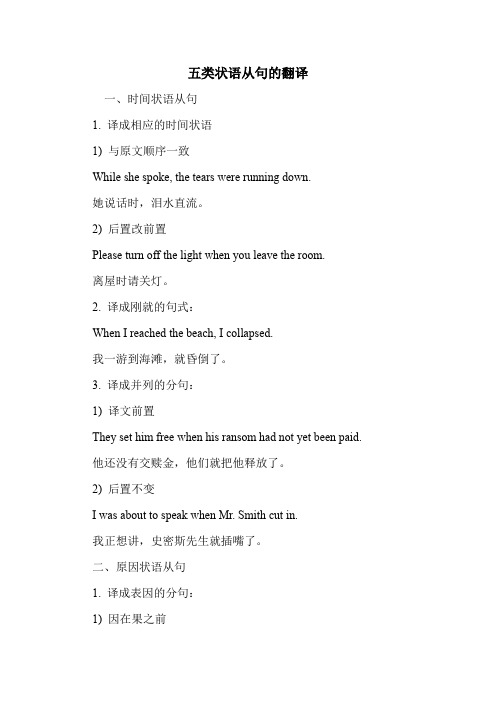
五类状语从句的翻译一、时间状语从句1. 译成相应的时间状语1) 与原文顺序一致While she spoke, the tears were running down.她说话时,泪水直流。
2) 后置改前置Please turn off the light when you leave the room.离屋时请关灯。
2. 译成刚就的句式:When I reached the beach, I collapsed.我一游到海滩,就昏倒了。
3. 译成并列的分句:1) 译文前置They set him free when his ransom had not yet been paid. 他还没有交赎金,他们就把他释放了。
2) 后置不变I was about to speak when Mr. Smith cut in.我正想讲,史密斯先生就插嘴了。
二、原因状语从句1. 译成表因的分句:1) 因在果之前The crops failed because the season was dry.因为气候干旱,作物歉收。
2) 果在因之前She could get away with anything, because she looked such a baby.她能渡过任何风险,因为她看上去简直还像娃娃模样。
2. 译成因果偏正复句中的主句:Pure iron is not used in industry because it is too soft.纯铁太软,所以不用在工业上。
Because he was convinced of the accuracy of this fact, he stuck to his opinion.他深信这件事正确可靠,因此坚持己见。
3. 译成无关联词的因果关系并列分句:Where there is sound, there must be sound waves.哪里有声音,哪里就必有声波。
英语状语从句的翻译
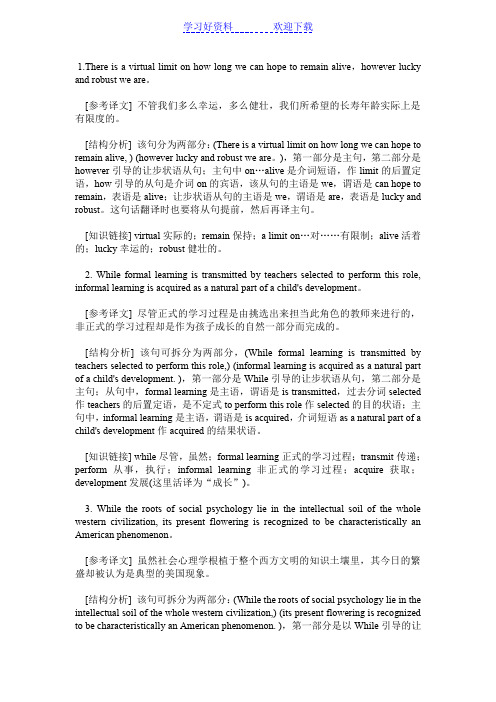
1.There is a virtual limit on how long we can hope to remain alive,however lucky and robust we are。
[参考译文] 不管我们多么幸运,多么健壮,我们所希望的长寿年龄实际上是有限度的。
[结构分析] 该句分为两部分:(There is a virtual limit on how long we can hope to remain alive, ) (however lucky and robust we are。
),第一部分是主句,第二部分是however引导的让步状语从句;主句中on…alive是介词短语,作limit的后置定语,how引导的从句是介词on的宾语,该从句的主语是we,谓语是can hope to remain,表语是alive;让步状语从句的主语是we,谓语是are,表语是lucky and robust。
这句话翻译时也要将从句提前,然后再译主句。
[知识链接] virtual实际的;remain保持;a limit on…对……有限制;alive活着的;lucky幸运的;robust健壮的。
2. While formal learning is transmitted by teachers selected to perform this role, informal learning is acquired as a natural part of a child's development。
[参考译文] 尽管正式的学习过程是由挑选出来担当此角色的教师来进行的,非正式的学习过程却是作为孩子成长的自然一部分而完成的。
[结构分析] 该句可拆分为两部分,(While formal learning is transmitted by teachers selected to perform this role,) (informal learning is acquired as a natural part of a child's development. ),第一部分是While引导的让步状语从句,第二部分是主句;从句中,formal learning是主语,谓语是is transmitted,过去分词selected 作teachers的后置定语,是不定式to perform this role作selected的目的状语;主句中,informal learning是主语,谓语是is acquired,介词短语as a natural part of a child's development作acquired的结果状语。
状语从句的译法
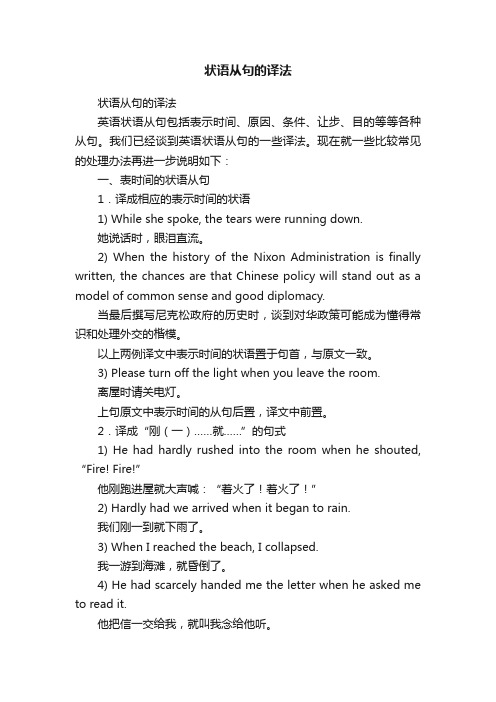
状语从句的译法状语从句的译法英语状语从句包括表示时间、原因、条件、让步、目的等等各种从句。
我们已经谈到英语状语从句的一些译法。
现在就一些比较常见的处理办法再进一步说明如下:一、表时间的状语从句1.译成相应的表示时间的状语1) While she spoke, the tears were running down.她说话时,眼泪直流。
2) When the history of the Nixon Administration is finally written, the chances are that Chinese policy will stand out as a model of common sense and good diplomacy.当最后撰写尼克松政府的历史时,谈到对华政策可能成为懂得常识和处理外交的楷模。
以上两例译文中表示时间的状语置于句首,与原文一致。
3) Please turn off the light when you leave the room.离屋时请关电灯。
上句原文中表示时间的从句后置,译文中前置。
2.译成“刚(一)……就……”的句式1) He had hardly rushed into the room when he shouted, “Fire! Fire!”他刚跑进屋就大声喊:“着火了!着火了!”2) Hardly had we arrived when it began to rain.我们刚一到就下雨了。
3) When I reached the beach, I collapsed.我一游到海滩,就昏倒了。
4) He had scarcely handed me the letter when he asked me to read it.他把信一交给我,就叫我念给他听。
3.译成并列的分句1) He shouted as he ran.他一边跑,一边喊。
状语从句的译法

状语从句的译法1时间状语的翻译消费者购买商品实质上是在给不同的企业和产品投票Customers actually vote for products and companies when they make a purchase.我方建议这批货从总价中削减50%,相信你方会认为这样对我方是公平的I’m sure you will think it fair on our part when we suggest that the total value of the parcel should be reduced by 50%.2 原因状语从句的翻译The country’s economy has emerged from recession because the government adopted some flexible policies.因为政府采取了一些灵活措施,所以该国的经济已经开始复苏。
Because the winter is coming, many fashion stores start to sell warm clothes.因为冬天即将来临,所以时装店开始销售卸寒衣服了。
3让步状语从句Although we’ve raised our market share by 5%, the competition remains fierce.虽然我们的市场份额提高了5%,但目前的竞争依然激烈。
4目的状语从句To reduce loss and increase overall profits, the CEO told his product managers to get rid of all the dogs.为了减亏损,全面增加利润,公司的首席执行官告诉产品部的经理们销毁所有的次品。
5条件状语从句So if you should reduce your price by, say 5%, we might come to terms.要是你们答应降价,比如5%,我们达成协议。
状语从句的翻译
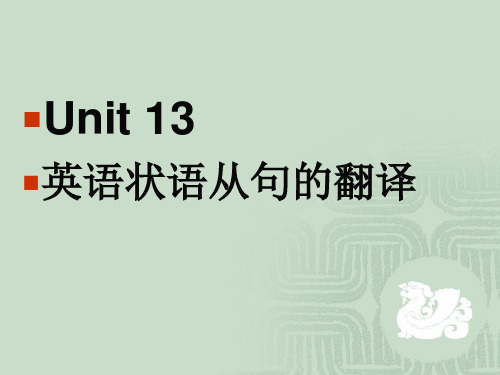
四、让步状语从句
(1)译成表示“让步”的分句。如“虽
然…但是…,尽管…”等。 11. Although humans are the most intelligent creature on earth, anything humans can do,Nature has already done better and in far,far less space. 虽然人类是地球上最聪明的生物,人能 创造一切,但大自然更富于创造性,早 已创造出比人类创造的更好更小巧的东 西。
(2) 表示目的的从句后置
16. In addition,the cameraman must
have a knowledge of composition so that the arrangement of the people and objects in each shot will produce the desired effect. 另外,摄影师必须具备合成的知识,以 便安排好每个镜头中的人和物来达到预 期的效果。
Un句
(1)译成相应的表示时间的状语 1. When they analyzed these rocks,
they found “shocked” quartz grains— slivers with a particular arrangement of micro cracks believed to represent the relic left by an extraterrestrial impact. 在分析这些岩芯时,他们发现“冲击” 石英颗粒———带有特殊排列的微裂缝 的薄片,科学家认为他们是外层空间来 的物体与地球碰撞留下来的遗迹。
11篇状语从句的翻译
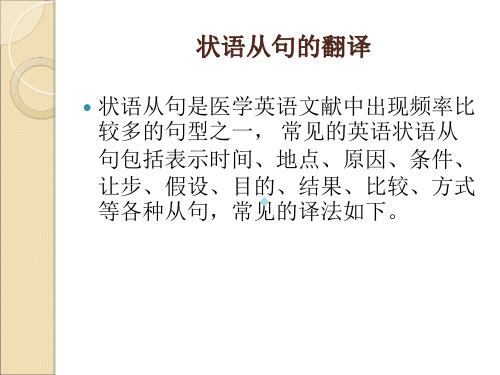
例1. As the patient is terribly ill, the doctor has gone to see him at his home.
例2. Since some side-effects such as nausea, skin rashes and vertigo are frequently encountered, the drug should be discontinued at the first sign of them.
11.1.3 译为并列的两个分句
例1. On hearing the results of examination, that female patient cried as he walked.
例2. When the patient walked along, he kept wondering what the doctor really meant.
状语从句的翻译
状语从句是医学英语文献中出现频率比 较多的句型之一, 常见的英语状语从 句包括表示时间、地点、原因、条件、 让步、假设、目的、结果、比较、方式 等各种从句,常见的译法如下。
OUTLINE:
11.1 表示时间的状语从句的译法 11.2 表示地点的状语从句译法 11.3 表示原因的状语从句的译法 11.4 表示条件、假设的状语从句的译法 11.5 表示让步的状语从句的译法 11.6 表示目的的状语从句的译法 11.7表示比较的状语从句的译法 11.8表示方式的状语从句的译法
the nurse stood where every patient could see her.
为了方便叫号,护士站在所有病人能看见她的地方。
例2. Pus formation may occur wherever there is
状语从句的翻译
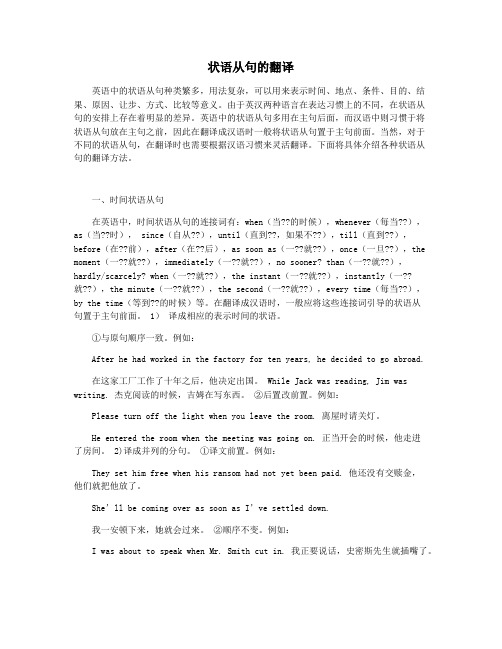
状语从句的翻译英语中的状语从句种类繁多,用法复杂,可以用来表示时间、地点、条件、目的、结果、原因、让步、方式、比较等意义。
由于英汉两种语言在表达习惯上的不同,在状语从句的安排上存在着明显的差异。
英语中的状语从句多用在主句后面,而汉语中则习惯于将状语从句放在主句之前,因此在翻译成汉语时一般将状语从句置于主句前面。
当然,对于不同的状语从句,在翻译时也需要根据汉语习惯来灵活翻译。
下面将具体介绍各种状语从句的翻译方法。
一、时间状语从句在英语中,时间状语从句的连接词有:when(当??的时候),whenever(每当??),as(当??时), since(自从??),until(直到??,如果不??),till(直到??),before(在??前),after(在??后),as soon as(一??就??),once(一旦??),the moment(一??就??),immediately(一??就??),no sooner? than(一??就??),hardly/scarcely? when(一??就??),the instant(一??就??),instantly(一??就??),the minute(一??就??),the second(一??就??),every time(每当??),by the time(等到??的时候)等。
在翻译成汉语时,一般应将这些连接词引导的状语从句置于主句前面。
1)译成相应的表示时间的状语。
①与原句顺序一致。
例如:After he had worked in the factory for ten years, he decided to go abroad.在这家工厂工作了十年之后,他决定出国。
While Jack was reading, Jim was writing. 杰克阅读的时候,吉姆在写东西。
②后置改前置。
例如:Please turn off the light when you leave the room. 离屋时请关灯。
状语从句翻译
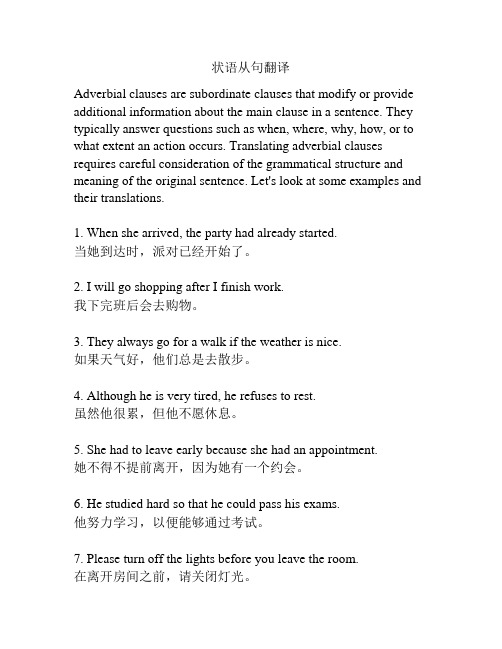
状语从句翻译Adverbial clauses are subordinate clauses that modify or provide additional information about the main clause in a sentence. They typically answer questions such as when, where, why, how, or to what extent an action occurs. Translating adverbial clauses requires careful consideration of the grammatical structure and meaning of the original sentence. Let's look at some examples and their translations.1. When she arrived, the party had already started.当她到达时,派对已经开始了。
2. I will go shopping after I finish work.我下完班后会去购物。
3. They always go for a walk if the weather is nice.如果天气好,他们总是去散步。
4. Although he is very tired, he refuses to rest.虽然他很累,但他不愿休息。
5. She had to leave early because she had an appointment.她不得不提前离开,因为她有一个约会。
6. He studied hard so that he could pass his exams.他努力学习,以便能够通过考试。
7. Please turn off the lights before you leave the room.在离开房间之前,请关闭灯光。
状语从句翻译例句
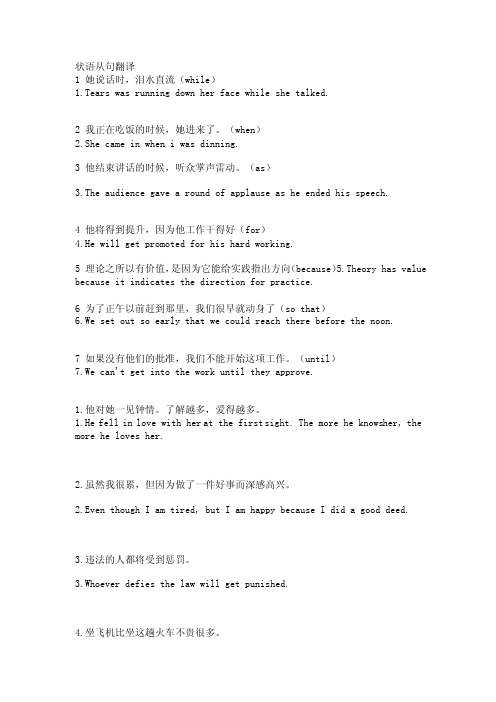
状语从句翻译1 她说话时,泪水直流(while)1.Tearswas runnin g down her face whileshe talked.2 我正在吃饭的时候,她进来了。
(when)2.She came in when i was dinnin g.3 他结束讲话的时候,听众掌声雷动。
(as)3.The audien ce gave a roundof applau se as he endedhis speech.4 他将得到提升,因为他工作干得好(for)4.He will get promot ed for his hard workin g.5 理论之所以有价值,是因为它能给实践指出方向(becaus e)5.Theory has valuebecaus e it indica tes the direct ion for practi ce.6 为了正午以前赶到那里,我们很早就动身了(so that)6.We set out so earlythat we couldreachtherebefore the noon.7 如果没有他们的批准,我们不能开始这项工作。
(until)7.We can't get into the work untilthey approv e.1.他对她一见钟情。
了解越多,爱得越多。
1.He fell in love with her at the firstsight.The more he knowsher, the more he lovesher.2.虽然我很累,但因为做了一件好事而深感高兴。
2.Even though I am tired, but I am happybecaus e I did a good deed.3.违法的人都将受到惩罚。
状语从句的翻译

状语从句的翻译英语中的状语从句种类繁多,用法复杂,可以用来表示时间、地点、条件、目的、结果、原因、让步、方式、比较等意义。
由于英汉两种语言在表达习惯上的不同,在状语从句的安排上存在着明显的差异。
英语中的状语从句多用在主句后面,而汉语中则习惯于将状语从句放在主句之前,因此在翻译成汉语时一般将状语从句置于主句前面。
当然,对于不同的状语从句,在翻译时也需要根据汉语习惯来灵活翻译。
下面将具体介绍各种状语从句的翻译方法。
一、时间状语从句在英语中,时间状语从句的连接词有:when(当……的时候),whenever(每当……),as(当……时), since(自从……),until (直到……,如果不……),till(直到……),before(在……前),after(在……后),as soon as(一……就……),once(一旦……),the moment(一……就……),immediately(一……就……),no sooner… than(一……就……),hardly/scarcely… when(一……就……),the instant(一……就……),instantly(一……就……),the minute (一……就……),the second(一……就……),every time(每当……),by the time(等到……的时候)等。
在翻译成汉语时,一般应将这些连接词引导的状语从句置于主句前面。
1)译成相应的表示时间的状语。
①与原句顺序一致。
例如:After he had worked in the factory for ten years, he decided to go abroad.在这家工厂工作了十年之后,他决定出国。
While Jack was reading, Jim was writing.杰克阅读的时候,吉姆在写东西。
②后置改前置。
例如:Please turn off the light when you leave the room.离屋时请关灯。
状语从句如何翻译?

状语从句如何翻译?一、时间状语从句在英语中,时间状语从句的连接词常常有:when(当...的时候),whenever(每当...),as(当...时), since(自从...),until(直到...,如果不....),till(直到...),before(在...前),after(在...后),as soon as(一...就),once(一旦...),the moment(一...就),immediately(一...就),theday(在...那天),no sooner... than(一...就),hardly(scarcely)...when(一...就),the instant(一...就),instantly(一...就),directly(一...就),the minute(一...就),the second(一...就),every time(每当...),by the time(等到....的时候)等。
翻译的时候,一般翻译在主句的前面。
(一)译成相应的时间状语While she spoke, the tears were running down.她说话时,泪水直流。
As he finished the speech, the audience burst into applause.他结束讲话的时候,听众掌声雷动。
(二)译成“一(刚、每)...就”的结构Directly he uttered these words there was a dead silence.他刚说出这些话,大家就沉默下来。
(三)译成条件句由于时间状语的引导词除了显示时间关系之外,有时候可以表示条件关系,所以还可以翻译为条件句。
Turn off the switch when anything goes wrong with the machine.如果机器发生故障,就把电门关上。
A body at rest will not move till a force is exerted on it.若无外力的作用,静止的物体不会移动。
- 1、下载文档前请自行甄别文档内容的完整性,平台不提供额外的编辑、内容补充、找答案等附加服务。
- 2、"仅部分预览"的文档,不可在线预览部分如存在完整性等问题,可反馈申请退款(可完整预览的文档不适用该条件!)。
- 3、如文档侵犯您的权益,请联系客服反馈,我们会尽快为您处理(人工客服工作时间:9:00-18:30)。
Before可以引导让步状语从句:
They would fight to death before they surrender.
Before可以引导条件状语从句:
You have to pay out fifty dollars in cash before they will give the toy gun to you.
• (一)译成表示“原因”的分句,放在主句之 前翻译,显示“前因后果”的关系。
• The crops failed because the season was dry. • 因为气候干旱,作物歉收。 • We had to put the meeting off, since so many
people were absent. • 由于很多人没有来,会议只好延期。
• (一)翻译在主句前面。 • It was better in case they were captured. • 要是把他们捉到了,那就更好了。 • If you tell me about it, then I shall be able
to decide. • 假如你把一切都告诉我,那么我就能够
• 他将得到提升,因为他工作干得好。
• 三、条件状语从句
• 英语中连接条件状语从句的连接词常常 有:if(如果),unless(除非,如果 不),providing that(假如),so long as (只要),on condition that(条件是), suppose that(假如),in case(如果), only if(只要),if only(但愿,要是... 就好了)等。
• (二)有时候可以用汉语的“之所以...是因为” 的结构来连接。
• A gas differs from solid in that it has no definite shape.
• 气体不同于固体是因为(就在于)它没有固定 的形状。
• He will get promoted, for he has done good work.
状语从句的翻译
பைடு நூலகம்
• 一、时间状语从句
• 在英语中,时间状语从句的连接词常常有: when(当...的时候),whenever(每当...), as(当...时), since(自从...),until(直 到...,如果不....),till(直到...),before (在...前),after(在...后),as soon as(一... 就),once(一旦...),the moment(一...就), immediately(一...就),the day(在...那天), no sooner... than(一...就),hardly(scarcely)... when(一...就),the instant(一...就), instantly(一...就),directly(一...就),the minute(一...就),the second(一...就), every time(每当...),by the time(等到....的 时候)等。
• (二)译成“一(刚、每)...就”的结 构
• I’ll let you know as soon as I have it arranged.
• 我一安排好就通知你。
• Directly he uttered these words there was a dead silence.
• 他刚说出这些话,大家就沉默下来。
在翻译“when”引导的时间状语从 句时,切忌不假思索以“当…..时候” 的句式套用 • She came in when I was having supper. • 我正在吃饭的时候,她进来了。 • 我正吃着饭,她进来了。
观察下面的例句,看译者是如何处理的:
He was on the verge of losing his temper with his wife when she uttered a cry. 他正要对妻子发脾气,忽听她哭叫起来。
• 二、原因状语从句
• 英语中,原因状语从句的连接词常常是: because(因为),since(既然,由于), as(因为),now that(既然),seeing that(既然),considering that(考虑到, 因为),in that(在某方面),in view of the fact that(鉴于)。
• (三)译成条件句 • Turn off the switch when anything goes
wrong with the machine. • 如果机器发生故障,就把电门关上。 • A body at rest will not move till a force is
exerted on it. • 若无外力的作用,静止的物体不会移动。
His interest in music dates back to his childhood, when he used to listen to his father playing the piano. 他对音乐的兴趣起源于童年时代的 熏陶,那时他就常常听父亲弹钢琴。
Before可以引导时间状语从句,中国人 习惯按照事物发展的先后顺序进行表达, 所以需对原文语序作一调整。 Get the lion out of here before it escapes and eats somebody.
• (一)译成相应的时间状语
• While she spoke, the tears were running down.
• 她说话时,泪水直流。
• As he finished the speech, the audience burst into applause.
• 他结束讲话的时候,听众掌声雷动。
